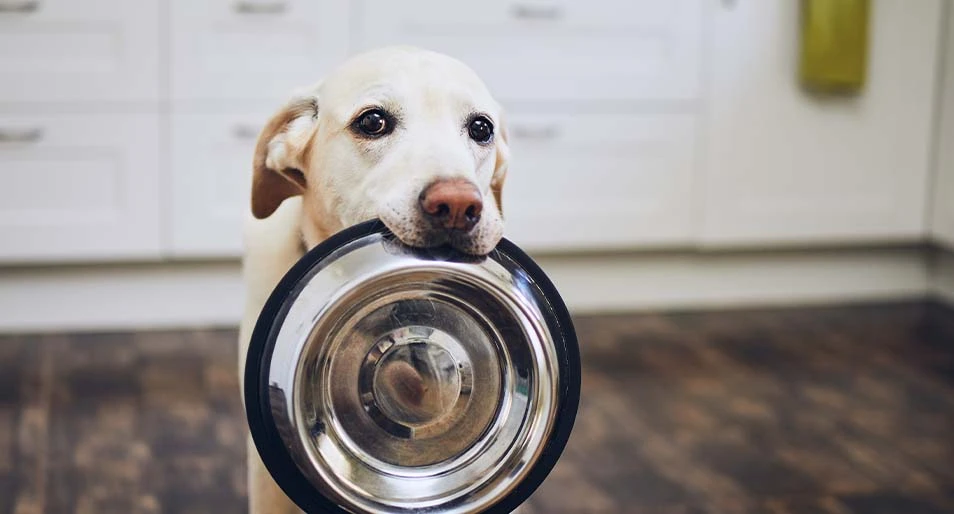PET HEALTH
Short answer: No, your dog shouldn’t eat ham. However, in small amounts or with certain products, it can be safe. While dogs are omnivores and eat a number of different kinds of meat alongside fruit and vegetables, ham shouldn’t cross your pet’s fuzzy lips if you can help it.
Is Ham Good for Dogs?
Small amounts of ham likely won’t harm your fur babies, but larger amounts could have dire consequences. It’s true that ham in small amounts is generally not bad for dogs, but it’s also not good for them. Ham may taste good but has no health benefits for dogs. It’s high in animal fat, sodium, sugar, and other preservatives, like nitrates, all of which can be harmful or even toxic to your dog’s health.1
Though all of these substances are harmful, the high sodium and fat found in ham can be detrimental.
High-sodium foods (like processed ham) can lead to uncomfortable symptoms in dogs, like vomiting, diarrhea, dehydration, and lethargy. In more serious cases, excess sodium can lead to even more dangerous health conditions, like kidney damage, seizures, comas, and sometimes death.2
Additionally, the high fat content makes ham difficult for dogs to digest. Too much fat in a dog’s diet can also lead to more drastic consequences, including pancreatitis and obesity.
Can Dogs Eat Ham Bones?
No. As a rule, ham bones aren’t the best choice of treats for your dog (or any pet, for that matter). When feeding bones to your dog, there are two options: cooked and raw. Both options can have unpleasant results.
Cooked ham bones can be okay for dogs, but run a high risk of bone splinters that can cause severe internal damage. Raw bones, while less likely to give your pup splinters, are filled with bacteria that could harm dogs. Ham bones can cause vomiting, fatigue, bloody stool, and dental problems for your furry bestie. So, if you do give your dog a ham bone, make sure to do so when you can be there to supervise and take action should anything happen. That said, you probably shouldn’t bother in the first place.
What To Do if Your Dog Eats Ham
If you are facing a situation in which your dog ingested ham, there are a few things you can do. Firstly, determine just how much ham your dog consumed. This will help you figure out if further action is needed.
If your dog ate a small amount of ham, it isn’t likely anything to panic about, but you should monitor them closely for a couple of hours. Watch out for:
● Vomiting
● Bowel issues, like diarrhea or constipation
● Atypical lethargy
If you notice any of these symptoms in your pet, contact your veterinarian immediately to prevent any further complications.
How To Safely Feed Your Dog Ham
As we mentioned earlier, small amounts of ham aren't likely going to harm your pet. An occasional deli slice or a small piece from your Thanksgiving dinner plate will probably turn out completely fine. However, fat should only make up about 5.5% of your adult dog’s diet, sodium only making up around 0.3%.3 That means, if you’re going to include ham in your dog’s diet, small doses are the safest way, but there are better meats and treats that could benefit your furry friend.
Dog foods and treats with ham in them
While ham is often not beneficial for dogs, if your best pal loves ham, of course you’ll want to make them happy. If that’s the case, the best way to do that is through FDA-approved dog foods and treats containing ham or have ham flavoring.4
● Nylabone's Healthy Edibles Broth Bone Natural Dog Treats
● Bed & Breakfast Wet Dog Food by Weruva
● Cesar's Ham and Egg Flavor with Potato & Cheese Wet Dog Food
● Navus Naturals’ Serrano Ham Recipe With Lamb Flavor Dog Treats
● HEB Texas Pets Meat Treats Maple Glazed Ham Flavor
● Beggin' Limited Edition Homestyle Honey 'n Ham Dog Treats by Purina
Let Your Dog Be a Ham Without Feeding It to Them
Generally, dogs can have ham in very small doses, but they really shouldn't. Although dogs do need protein, this source of protein comes at a higher risk than chicken or beef. Its high fat and sodium content can be detrimental to your beloved pet’s health and is far riskier than leaner, less processed meat choices.
As we know, accidents can happen. If your pet gets their paws on too much ham and is showing signs of discomfort, they may need to see a vet. Having a MetLife Pet dog insurance policy can help you cover some of the vet bills for diagnostics, treatment, and exams to get your pup feeling better. See your plan options and prices by getting a free quote today.

